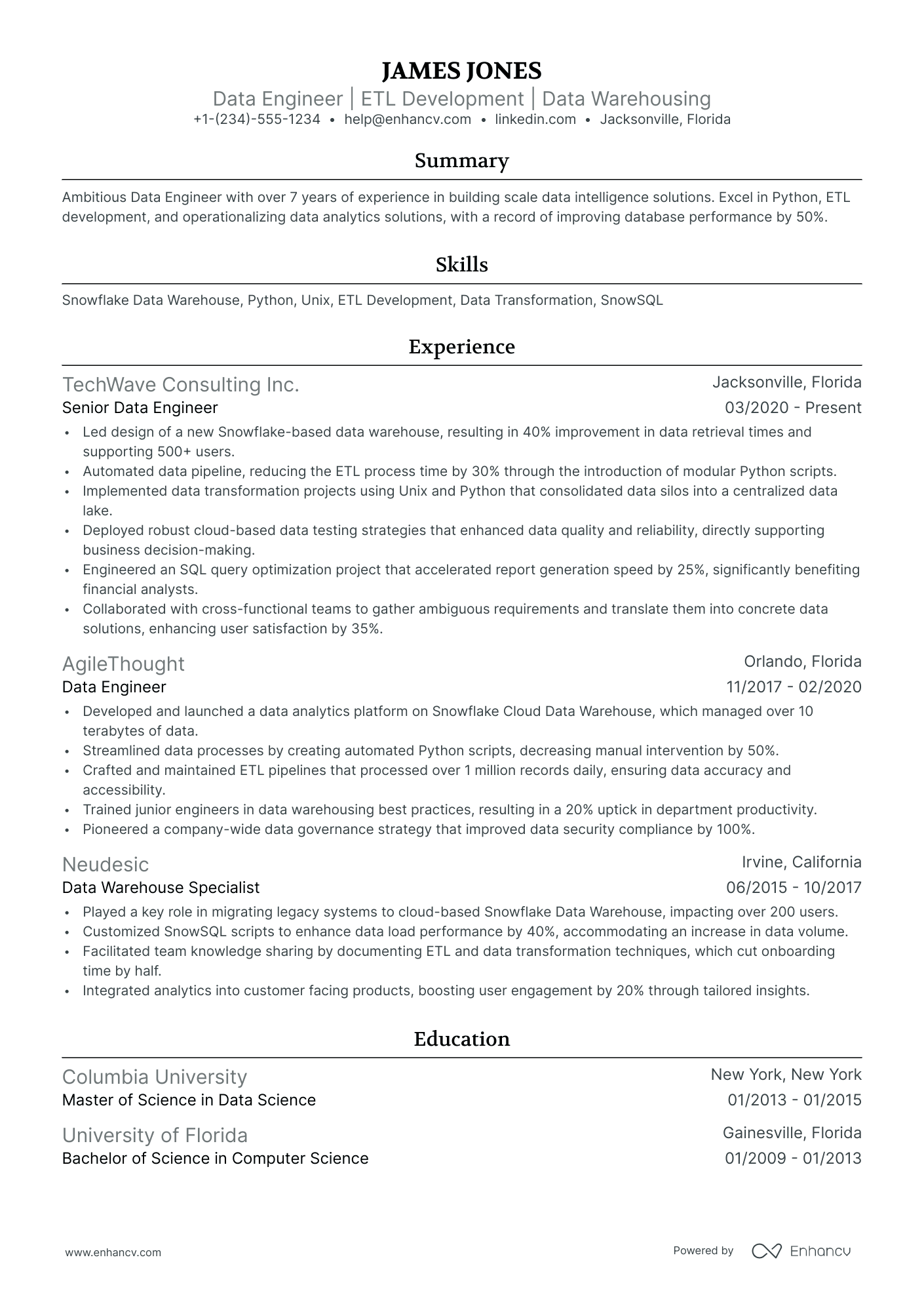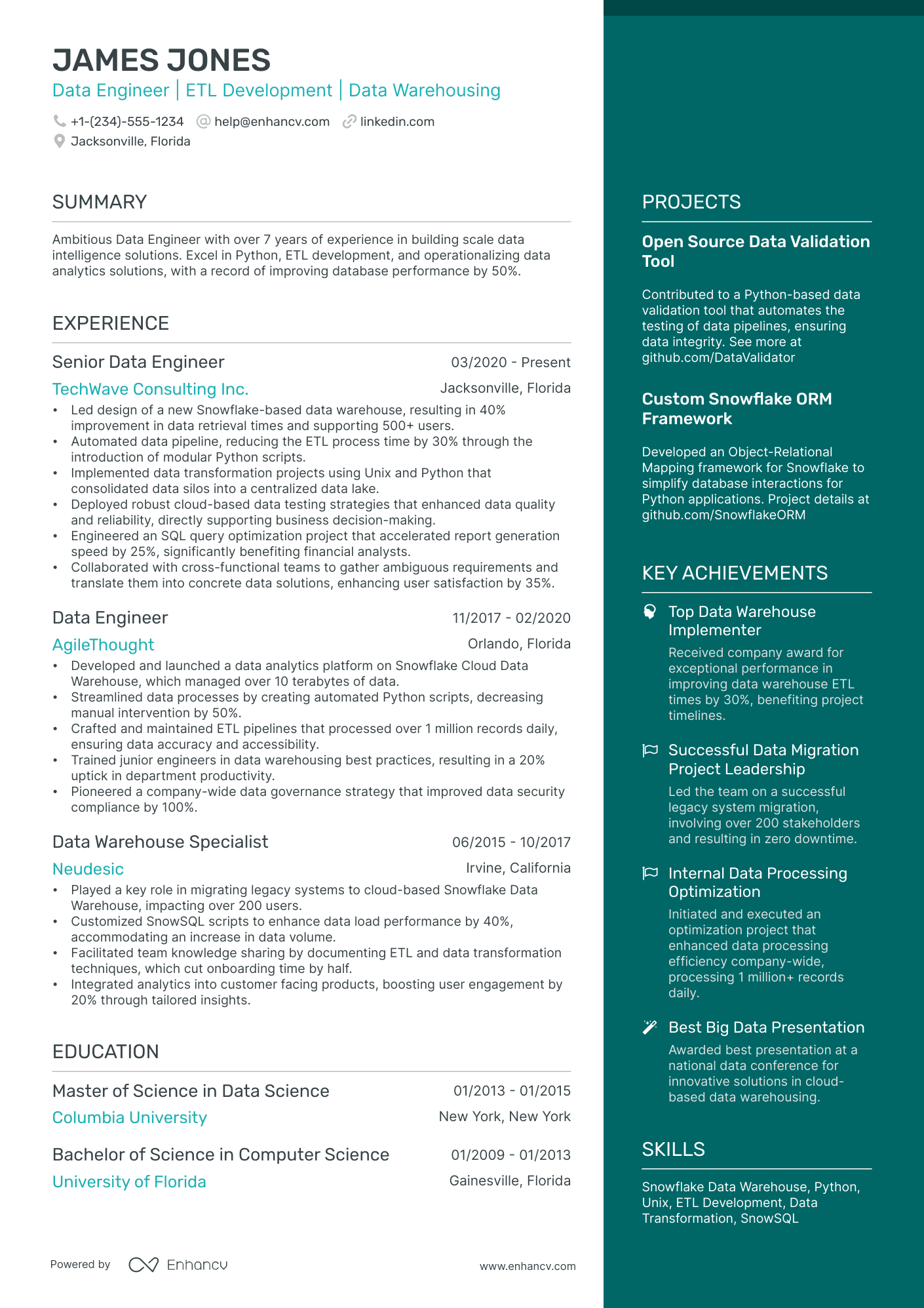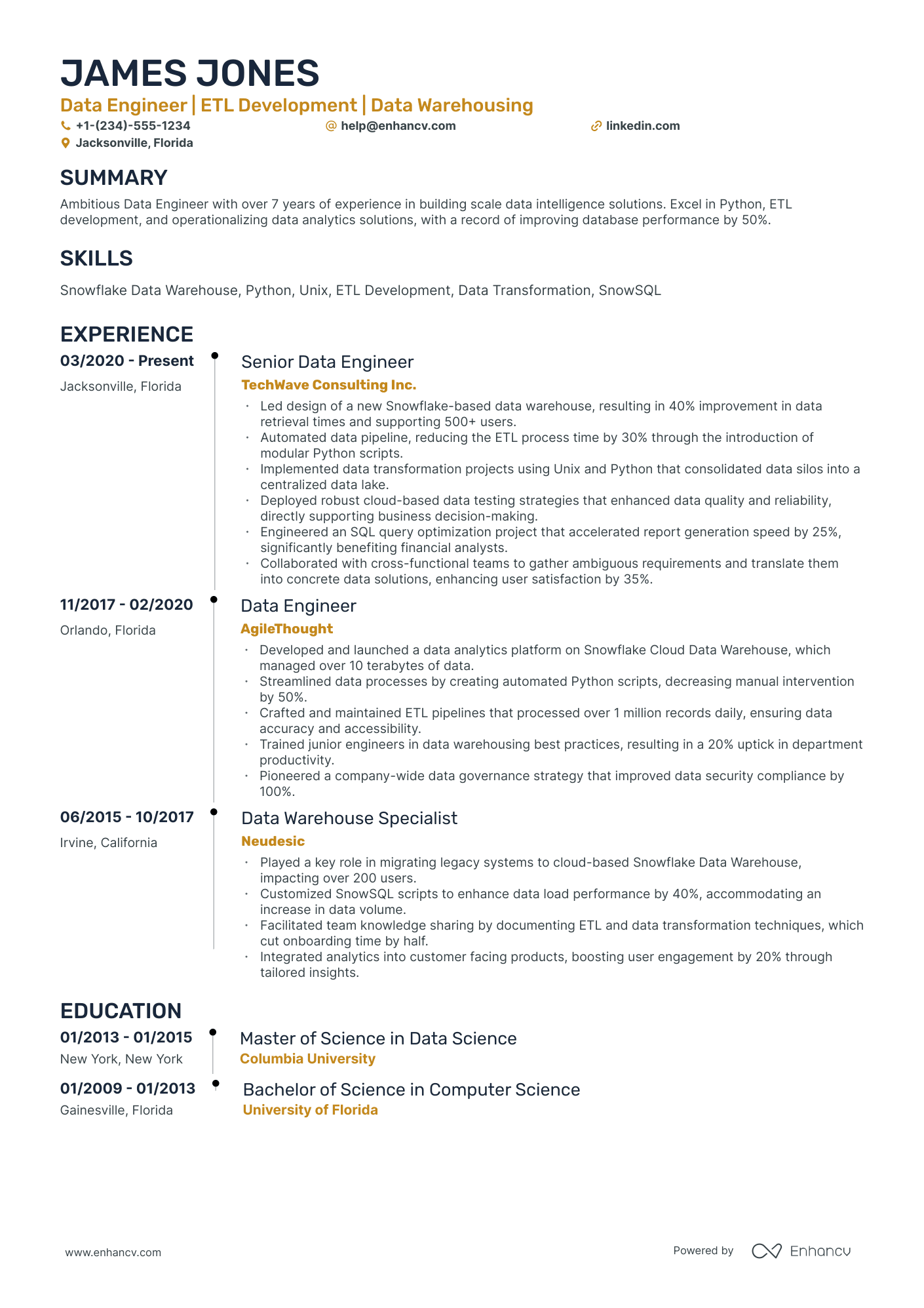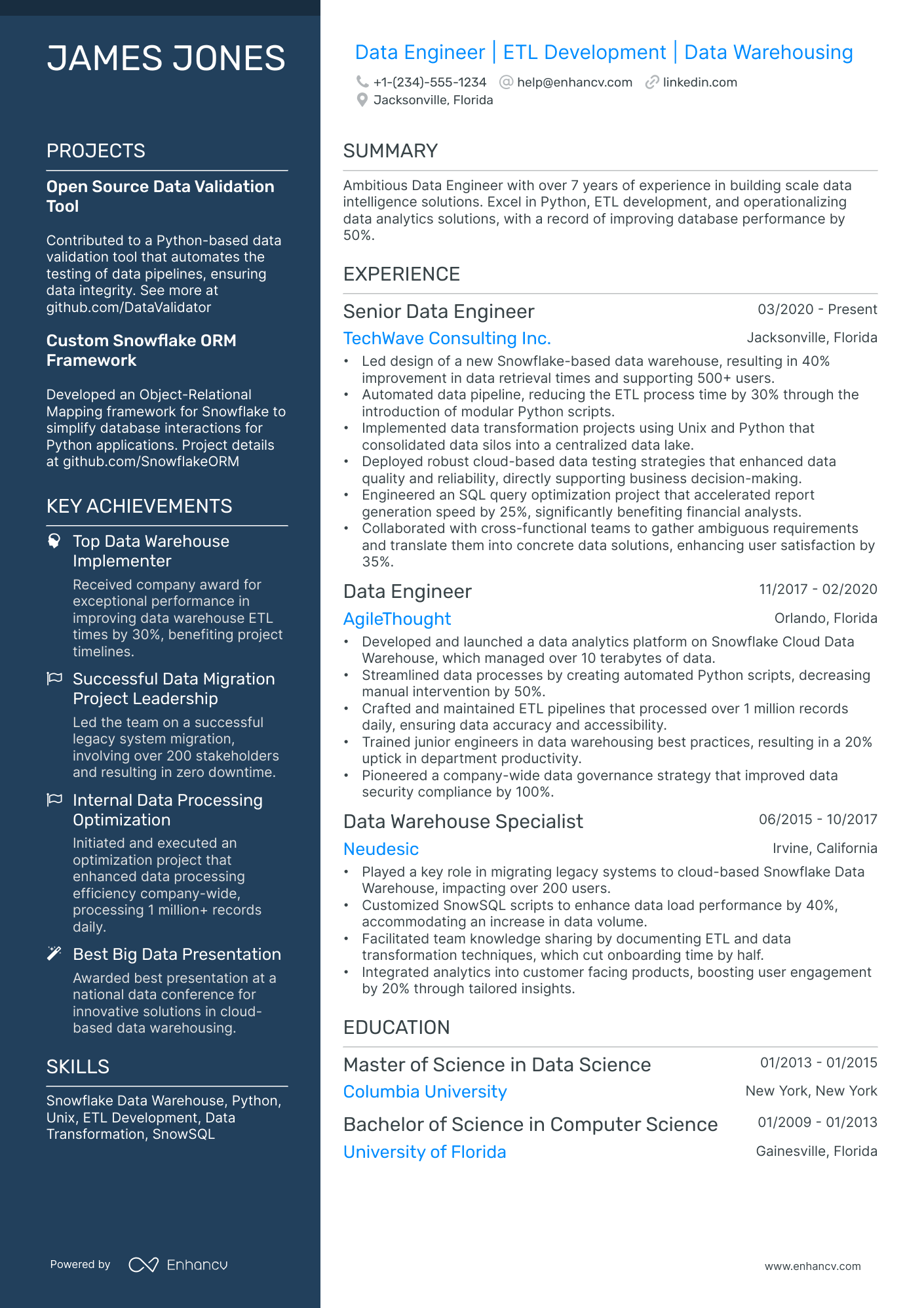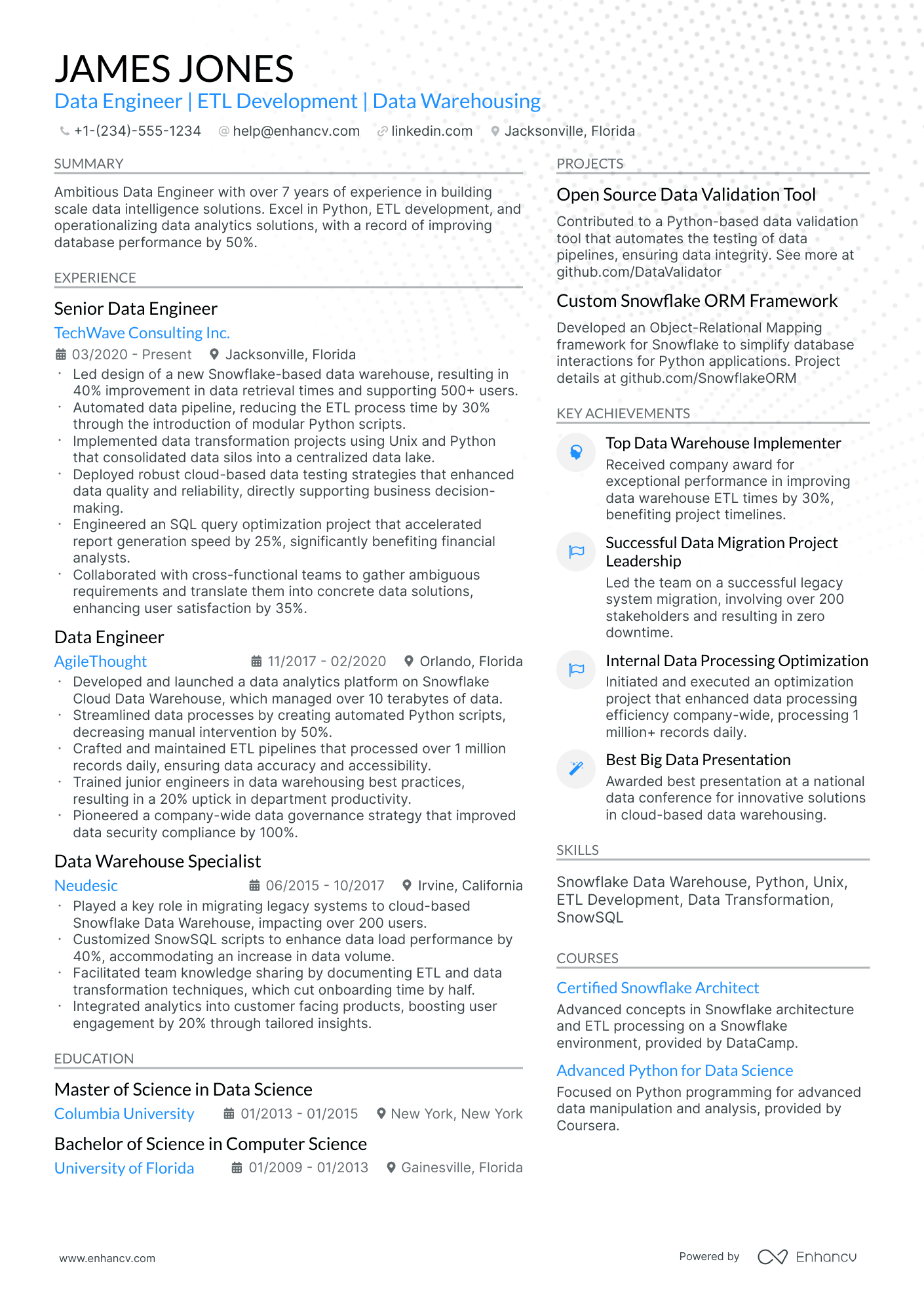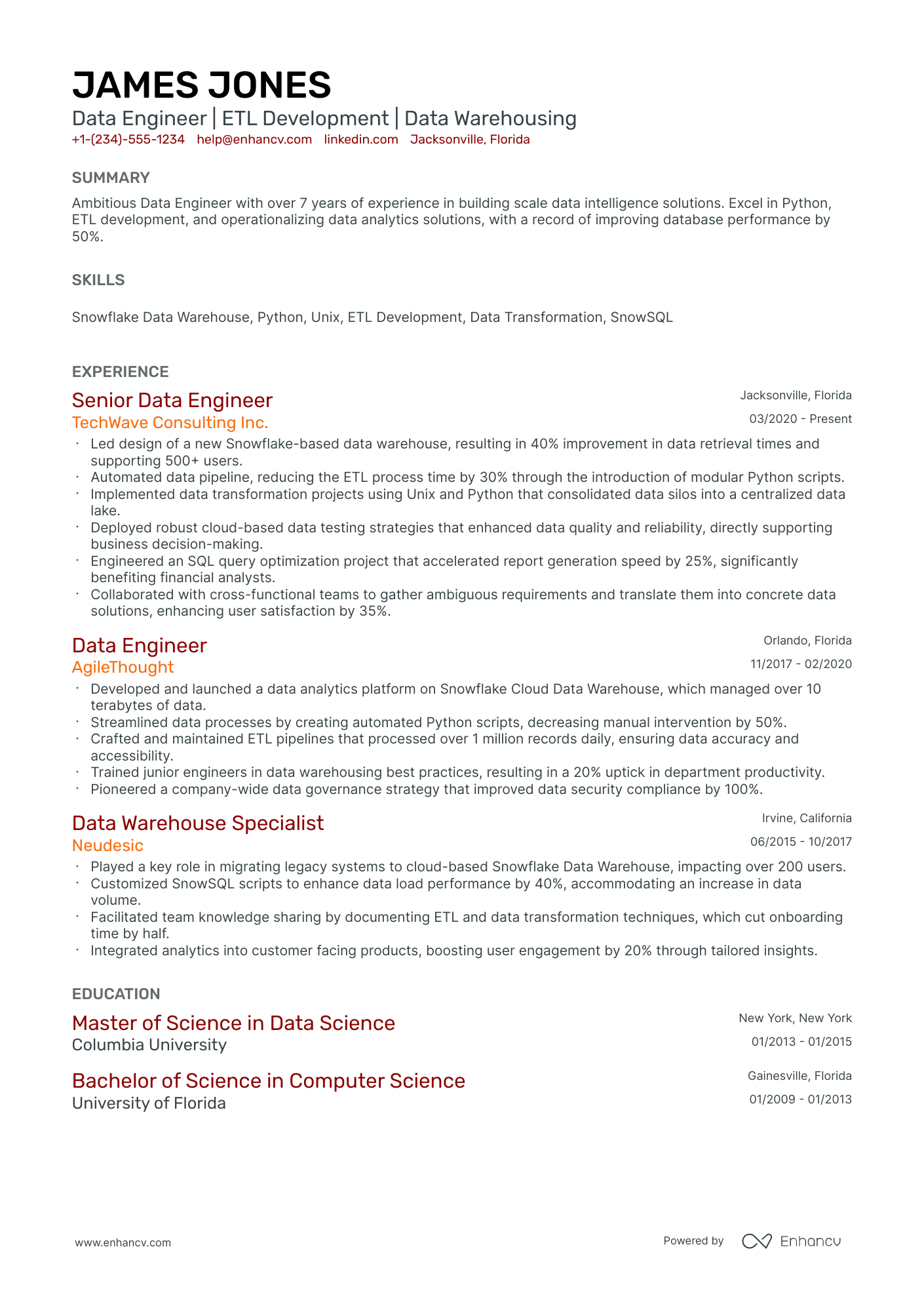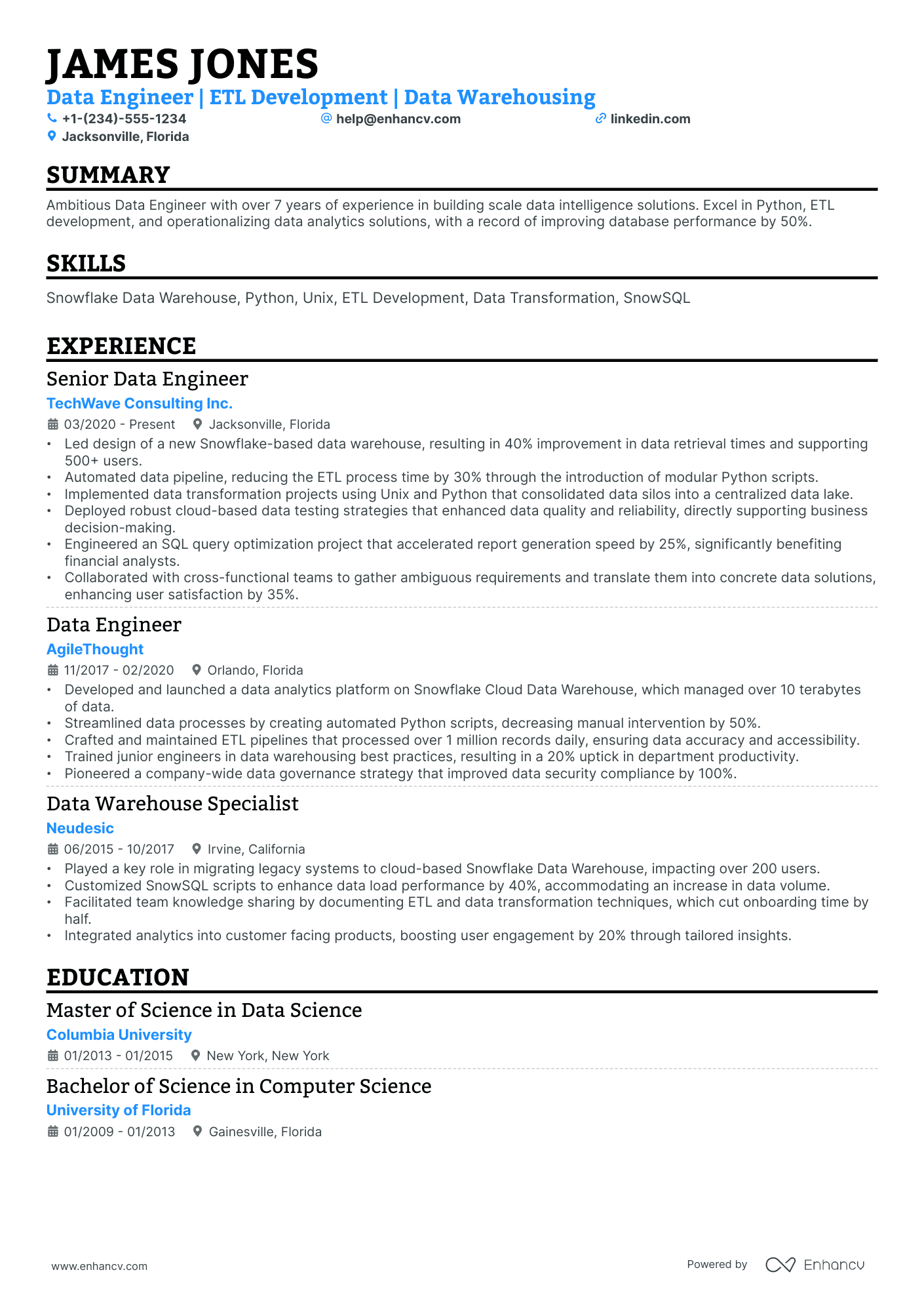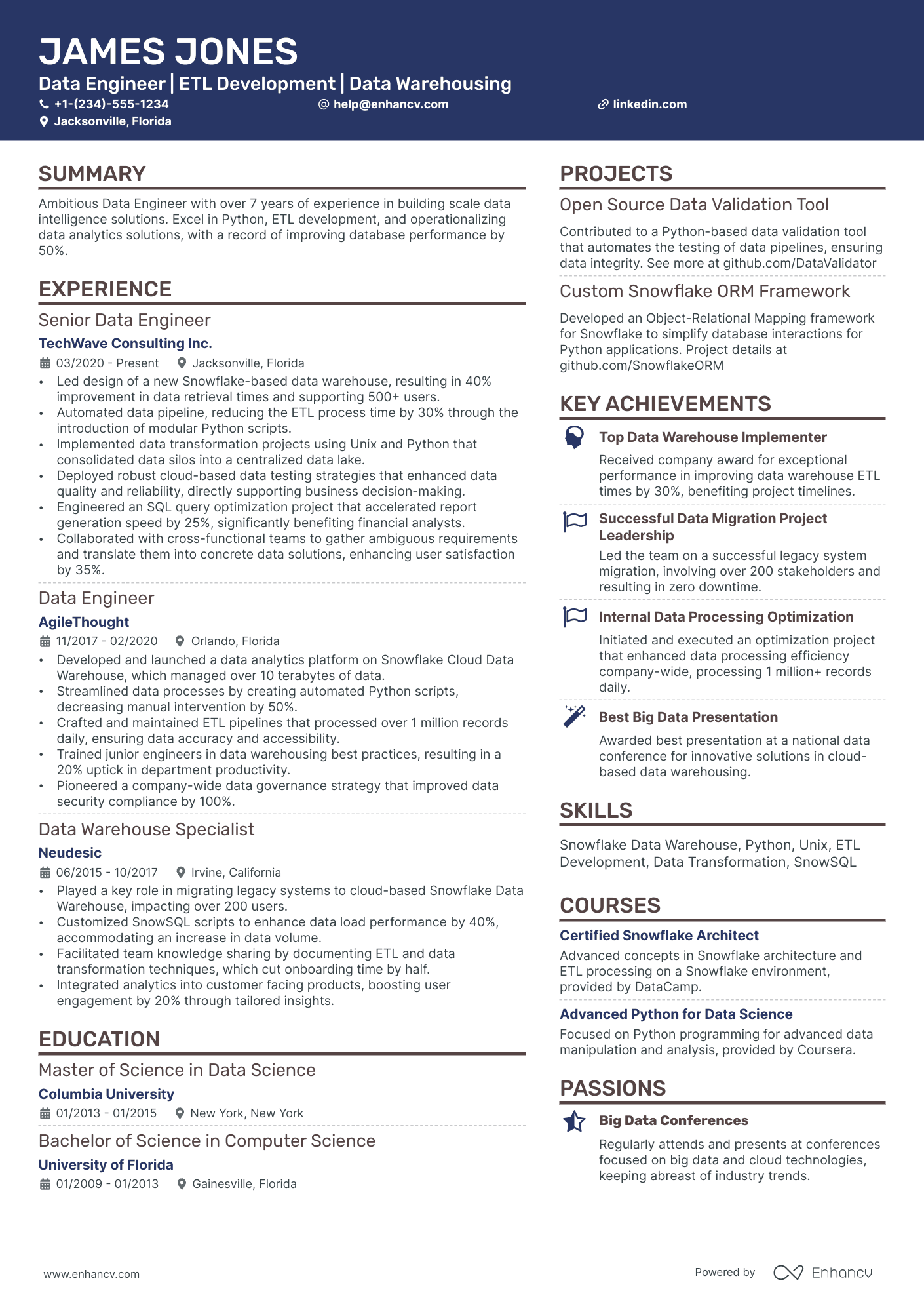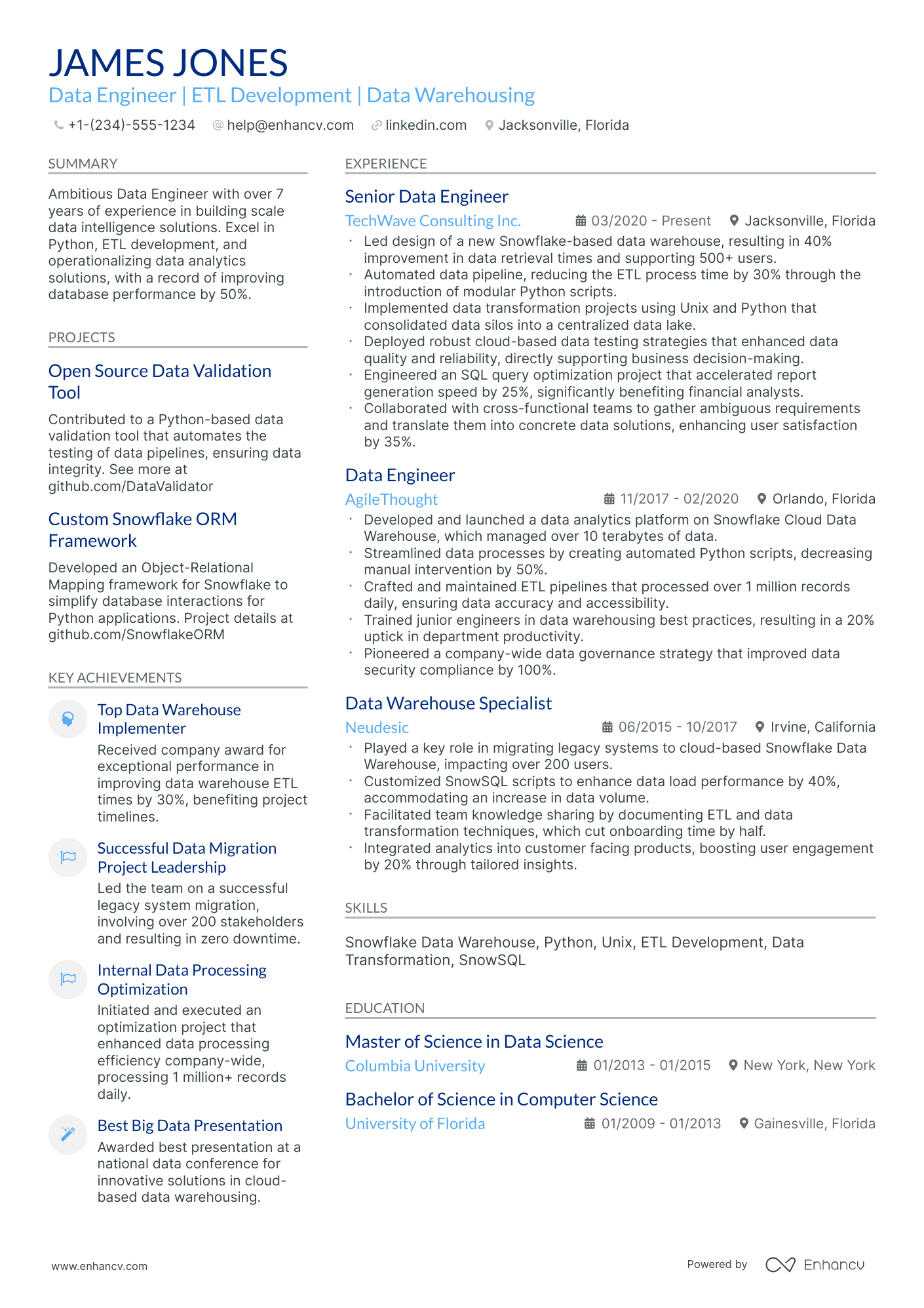As a snowflake developer, articulating your experience with complex data warehousing solutions can be a daunting task on your resume. Our guide is designed to help you effectively showcase your technical prowess and project accomplishments, ensuring your unique skill set shines through to potential employers.
- The most straightforward and effective resume format, ensuring your snowflake developer resume stands out among numerous candidate profiles;
- The significance of the top one-third of your resume, including the header, summary or objective, and skills section, and its impact on recruiters;
- Frameworks and structures used by real snowflake developer professionals, offering insights on how to enhance your resume with industry-specific expertise;
- A variety of snowflake developer resume sections that bolster your profile, showcasing your comprehensive capabilities and distinctiveness.
Gaining insights from the best has never been easier. Explore more snowflake developer resume examples below:
- Voip Network Engineer Resume Example
- IT Support Analyst Resume Example
- Wordpress Developer Resume Example
- Cnc Programmer Resume Example
- Cmm Programmer Resume Example
- Splunk Developer Resume Example
- Ccna Network Engineer Resume Example
- QA Analyst Resume Example
- Application Support Manager Resume Example
- Database Developer Resume Example
Snowflake developer resume format made simple
You don't need to go over the top when it comes to creativity in your snowflake developer resume format .
What recruiters care about more is the legibility of your snowflake developer resume, alongside the relevancy of your application to the role.
That's why we're presenting you with four simple steps that could help your professional presentation check all the right boxes:
- The reverse-chronological resume format is the one for you, if you happen to have plenty of relevant (and recent) professional experience you'd like to showcase. This format follows a pretty succinct logic and puts the focus on your experience.
- Keep your header simple with your contact details; a headline that details the role you're applying for or your current job; and a link to your portfolio.
- Ensure your resume reaches an up-to-two-page limit, only if you happen to be applying for a more senior role or you have over a decade of relevant experience.
- Save your snowflake developer resume as a PDF to retain its structure and presentation.
Be mindful of regional differences in resume formats – a Canadian layout, for instance, might vary.
Upload & Check Your Resume
Drop your resume here or choose a file. PDF & DOCX only. Max 2MB file size.
PRO TIP
If you happen to have plenty of certificates, select the ones that are most applicable and sought-after across the industry. Organize them by relevance to the role you're applying for.
Traditional sections, appreciated by recruiters, for your snowflake developer resume:
- Clear and concise header with relevant links and contact details
- Summary or objective with precise snapshot of our career highlights and why you're a suitable candidate for the snowflake developer role
- Experience that goes into the nuts and bolts of your professional qualifications and success
- Skills section(-s) for more in-depth talent-alignment between job keywords and your own profile
- Education and certifications sections to further show your commitment for growth in the specific niche
What recruiters want to see on your resume:
- Proficiency with Snowflake’s cloud data platform and its features, such as Snowpipe, Time Travel, and Zero-Copy Cloning.
- Experience with SnowSQL, Snowflake's command-line interface, and the ability to write complex SQL queries for large-scale data analytics.
- Understanding of data warehousing concepts and hands-on experience with Snowflake's unique architecture and caching mechanisms.
- Familiarity with data migration strategies to Snowflake from other databases or data warehouses and knowledge of ETL processes and tools like Matillion, Talend, or Informatica that integrate with Snowflake.
- Knowledge of Snowflake's security features, such as encryption, data masking, and role-based access control, ensuring data compliance and security.
What is the resume experience section and how to write one for your past roles
The experience section in a snowflake developer resume is critical for your profile and overall application. It should not only display your work history, but also highlight your achievements in previous roles.
Many candidates either simply list their duties or provide excessive details about past, irrelevant jobs. A more effective approach involves first examining the job advertisement for keywords - specifically, skills essential for the role. Then, demonstrate these key requirements throughout different parts of your resume, using accomplishments from your roles.
Format each bullet point in your experience section by starting with a strong action verb. Follow this with a description of your role and its impact on the team or organization.
Aim to include three to five bullet points for each role.
Finally, gain insights into how professionals have crafted their snowflake developer resume experience sections by exploring some best practice examples.
- Spearheaded the migration of massive datasets totaling over 5TB from a legacy data warehouse to Snowflake, ensuring seamless transfer with no downtime.
- Designed and implemented a set of scalable Snowflake solutions for real-time data analytics, increasing data retrieval speed by 300%.
- Collaborated with cross-functional teams to integrate third-party APIs, resulting in a 40% reduction in manual data entry and a significant decrease in human error.
- Developed and optimized numerous stored procedures, functions, and SQL queries in Snowflake, resulting in an enhanced report generation process that saved 20 hours of work weekly.
- Conducted in-depth performance tuning of Snowflake environment, which decreased query response times by over 60%.
- Facilitated data governance and compliance by implementing Snowflake's data encryption and role-based access control for sensitive financial data.
- Integrated Snowflake with data lake solutions using Apache Spark to support advanced analytics, reducing the data processing time by 50% for large datasets.
- Automated data ingestion and ETL processes using Snowpipe, improving the data availability and freshness for critical business dashboards and decision-making.
- Lead the deployment of a Snowflake's multi-cluster architecture to balance workloads and optimize the performance for more than 500 concurrent users.
- Administered the security and governance of a Snowflake multi-tenant environment, securing sensitive data for a client portfolio that included three Fortune 500 companies.
- Drove cost optimizations by monitoring and analyzing warehouse usage and implementing autoscaling policies that reduced compute costs by up to 30% without sacrificing performance.
- Managed disaster recovery strategies for Snowflake implementations, enabling business continuity with 99.99% availability during multiple unforeseen data outages.
- Orchestrated a cloud-based business intelligence solution using Snowflake, serving multiple departments and empowering end-users with self-service analytics.
- Lead a team of developers in the adoption of Snowflake's Zero-Copy Cloning feature for testing purposes, which cut down the release cycle time by 25%.
- Pioneered the use of Snowflake's Time Travel and Fail-safe features for historical data analysis, significantly improving the ability to conduct point-in-time and trend analysis.
- Implemented complex ETL pipelines in Snowflake that allowed for the ingestion and transformation of diverse data sources, enhancing the analytical data foundation.
- Executed a company-wide analytical platform modernization with Snowflake, resulting in a 70% improvement in query performance for analytical teams.
- Designed a comprehensive data model in Snowflake specifically tailored for marketing analytics, leading to a 20% increase in campaign ROI due to improved targeting.
- Led a strategic data consolidation initiative in a Snowflake environment, which allowed the business to decommission older data systems and reduce operational costs by 15% annually.
- Expertly optimized data storage and compute resources in Snowflake, implementing a novel data clustering approach that increased query performance by over 40%.
- Directed the successful integration of Snowflake with a suite of machine learning tools to enable advanced predictive analytics for customer behavior forecasting.
- Involved in the initial inception and setup of Snowflake for a pioneering client, setting the standards for future deployments and integrations.
- Created robust data validation and error-handling frameworks within Snowflake, ensuring high data quality metrics and lowering the error rate by 45%.
- Boosted team productivity by implementing a series of custom Snowflake-based automation scripts for recurring maintenance tasks and performance monitoring.
Quantifying impact on your resume
- Include the number of Snowflake warehouse optimizations you've implemented to reduce costs and improve query performance.
- List the volume of data you've migrated to Snowflake, showing your experience with large-scale data operations.
- Highlight the percentage reduction in data processing times after moving workflows to Snowflake.
- Quantify the number of data pipelines you've created or maintained within Snowflake's ecosystem.
- Detail the increase in report generation efficiency by using Snowflake's features, from a time-savings perspective.
- Specify the count of concurrent users or queries your Snowflake implementation has supported, reflecting your ability to scale systems.
- Mention the size of the databases you've managed in Snowflake to demonstrate your capacity for handling complex data architectures.
- Present the number of user-defined functions or stored procedures you've authored in Snowflake, indicating your custom development skills.
Action verbs for your snowflake developer resume
What if you don't have any experience?
There are two very common scenarios about candidates with less experience. They are either:
- Fresh out of college in search of a snowflake developer role
- Transferring over from a completely different field
Both of these types of candidates still have a shot at landing their first job in the industry.
All they need to do about the experience section of their snowflake developer resume is:
- Consider their strengths - would the outcomes of their previous roles or niche skill sets impress recruiters? Feature those towards the top of your resume
- Exclude any and all irrelevant experience items - remember that at the end of the day, you're telling a story that aims to align with the ideal candidate for the snowflake developer job
- Win recruiters over with personality - perhaps your ambition, dreams, and diligence would make you the perfect fit for the snowflake developer role. Dedicate resume space to detail your personality traits by showcasing how they've helped you succeed in past roles
- Tailor your experience to specific job requirements - ensure your snowflake developer resume answers the advert in the best way possible.
Recommended reads:
PRO TIP
Showcase any ongoing or recent educational efforts to stay updated in your field.
Bringing your snowflake developer hard skills and soft skills to the forefront of recruiters' attention
Hard skills are used to define the technological (and software) capacities you have in the industry. Technical skills are easily defined via your certification and expertise.
Soft skills have more to do with your at-work personality and how you prosper within new environments. People skills can be obtained thanks to your whole life experience and are thus a bit more difficult to define.
Why do recruiters care about both types of skills?
Hard skills have more to do with job alignment and the time your new potential employers would have to invest in training you.
Soft skills hint at how well you'd adapt to your new environment, company culture, and task organization.
Fine-tune your resume to reflect on your skills capacities and talents:
- Avoid listing basic requirements (e.g. "Excel"), instead substitute with the specifics of the technology (e.g. "Excel Macros").
- Feature your workplace values and ethics as soft skills to hint at what matters most to you in a new environment.
- Build a separate skills section for your language capabilities, only if it makes sense to the role you're applying for.
- The best way to balance snowflake developer hard and soft skills is by building a strengths or achievements section, where you define your outcomes via both types of skills.
There are plenty of skills that could make the cut on your resume.
That's why we've compiled for you some of the most wanted skills by recruiters, so make sure to include the technologies and soft skills that make the most sense to you (and the company you're applying for):
Top skills for your snowflake developer resume:
Snowflake
SQL
Data Warehousing
ETL Tools
Python
Data Modeling
Cloud Computing
Performance Tuning
Data Integration
BI Tools
Problem Solving
Communication
Teamwork
Adaptability
Attention to Detail
Time Management
Analytical Thinking
Critical Thinking
Project Management
Creativity
PRO TIP
The more trusted the organization you've attained your certificate (or degree) from, the more credible your skill set would be.
Showcase academic background with education and certifications' sections
Listing your education and certifications should be a rudimentary part of your resume writing.
Including your relevant academic background - in the form of your higher education degree and niche-specific certificates - will prove knowledge of the industry.
For your education section:
- Start by including your degree, followed by start and graduation dates, as well as the institution;
- You could include relevant coursework, major/minor , or GPA, only if your've just graduated from college or if this information would further support your application;
- If you have an "ongoing" degree, you can still list it in case you think your diploma can impress recruiters or it's required;
Follow a similar logic for your certifications section by listing the institution, alongside dates you've obtained the certificate. For some of the most recent and relevant industry certificates , check out the next part of our guide:
The top 5 certifications for your snowflake developer resume:
- SnowPro Core Certification (SnowPro Core) - Snowflake Inc.
- SnowPro Advanced: Architect Certification (SnowPro Advanced Architect) - Snowflake Inc.
- SnowPro Advanced: Data Engineer Certification (SnowPro Advanced Data Engineer) - Snowflake Inc.
- SnowPro Advanced: Data Scientist Certification (SnowPro Advanced Data Scientist) - Snowflake Inc.
- Amazon Web Services Certified Data Analytics - Specialty (AWS Certified Data Analytics) - Amazon Web Services (AWS)
PRO TIP
List all your relevant higher education degrees within your resume in reverse chronological order (starting with the latest). There are cases when your PhD in a particular field could help you stand apart from other candidates.
Recommended reads:
Choosing between a snowflake developer resume summary or objective
Many may argue that, in recent times, the snowflake developer resume summary or objective has become completely obsolete.
But the reality is different as both of these resume sections provide you with an opportunity to :
- integrate snowflake developer-vital keywords
- showcase your accomplishments
- answer why you're applying for this particular role.
The difference (between the summary and the objective) is that the:
- Resume objective puts your career goals in a more prominent position.
- Resume summary focuses more on career milestones.
We recommend you select the summary if you happen to have plenty of experience you'd like to spotlight from the very start of your snowflake developer resume.
Meanwhile, the objective is ideal for those candidates who'd like to further prove their suitability for the role with their goals and soft skills.
We've featured some industry professional snowflake developer resume samples to the best resume summary and objective structures:
Resume summaries for a snowflake developer job
- Seasoned snowflake developer with over 5 years of hands-on experience in large-scale data warehousing projects. Possesses a deep knowledge of Snowflake's ecosystem and a track record of boosting query performance by 40%. Successfully led the migration of a 10TB on-premise data warehouse to Snowflake, enhancing data accessibility and scalability for a leading e-commerce platform.
- Dynamic IT professional with 3 years of experience in database management and cloud computing. Aims to leverage knowledge of AWS and Python programming to transition into Snowflake development. Proven success in automating data pipelines and streamlining ETL processes which resulted in a 30% reduction in data processing times at a major financial institution.
- An ambitious Data Analyst looking to pivot into Snowflake development, bringing 4 years of experience in data analytics and machine learning. Excellent command of SQL and a strong understanding of data modelling, eager to apply advanced analytics skills to maximize the efficiency of cloud-based data storage and management solutions.
- Accomplished Data Engineer with 6 years of experience in developing, deploying, and managing sophisticated data solutions. Excels in Python, SQL, and data architecture, with a passion for cloud technologies and a significant achievement in decreasing data retrieval times by 50% through designing optimized data models on Snowflake for a leading logistics company.
- Aspiring snowflake developer with a robust foundation in computer science and a passion for data-driven insights. Eager to leverage current knowledge of cloud services, databases, and coding to specialize in Snowflake's unique architecture and data sharding methodology to deliver high-performance data solutions.
- Recent graduate with a degree in Information Technology, enthusiastic about starting a career in Snowflake development. Motivated to employ a fresh perspective on data warehousing, analytics, and proficiency in Python and SQL to facilitate the delivery of cutting-edge, cloud-based data-driven applications.
Optimize your resume summary and objective for ATS
Drop your resume here or choose a file.
PDF & DOCX only. Max 2MB file size.
Extra sections to include in your snowflake developer resume
What should you do if you happen to have some space left on your resume, and want to highlight other aspects of your profile that you deem are relevant to the role? Add to your snowflake developer resume some of these personal and professional sections:
- Passions/Interests - to detail how you spend both your personal and professional time, invested in various hobbies;
- Awards - to present those niche accolades that make your experience unique;
- Publications - an excellent choice for professionals, who have just graduated from university or are used to a more academic setting;
- Volunteering - your footprint within your local (or national/international) community.
Key takeaways
- Pay special attention to the tiny details that make up your snowflake developer resume formatting: the more tailored your application to the role is, the better your chances at success would be;
- Select the sections you include (summary or objective, etc.) and formatting (reverse-chronological, hybrid, etc.) based on your experience level;
- Select experience items and, consequently, achievements that showcase you in the best light and are relevant to the job;
- Your profile will be assessed both based on your technical capabilities and personality skills - curate those through your resume;
- Certifications and education showcase your dedication to the particular industry.
